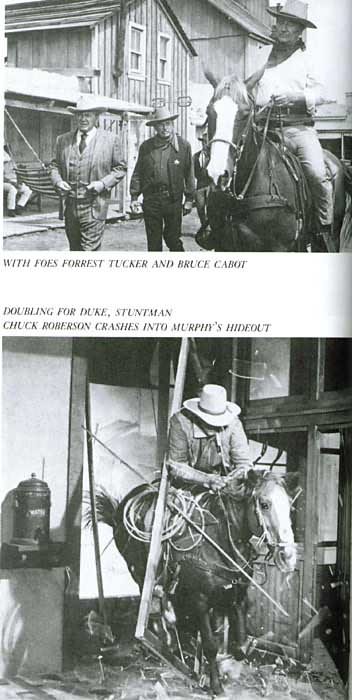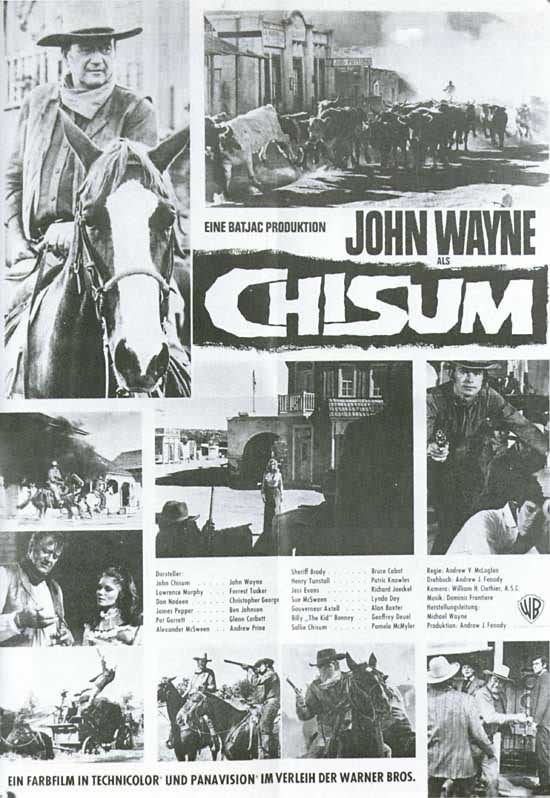- CHISUM (1970)
- By Lee Pfeiffer
- The John Wayne Scrapebook, 1989
 Cast: John Wayne, Forrest Tucker, Christopher George,
Pamela McMyler, Geoffrey Deuel, Ben Johnson, Glenn Corbett, Bruce
Cabot, Andrew Prine, Patric Knowles, Richard Jaeckel. Director:
Andrew V. McLaglen. Screenplay: Andrew J. Fenady. Music:
Dominic Frontiere. Released by: Warner Bros. Running
Time: 110 Minutes.
Cast: John Wayne, Forrest Tucker, Christopher George,
Pamela McMyler, Geoffrey Deuel, Ben Johnson, Glenn Corbett, Bruce
Cabot, Andrew Prine, Patric Knowles, Richard Jaeckel. Director:
Andrew V. McLaglen. Screenplay: Andrew J. Fenady. Music:
Dominic Frontiere. Released by: Warner Bros. Running
Time: 110 Minutes.
Following Duke's triumph in True Grit,
the actor went immediately to work on The Undefeated, a
large-scale Western co-starring Rock Hudson. Despite some impressive
scenery and action, the film was basically a routine hoss opera
that does not rank among Wayne's more memorable movies. Fans wondered
if he would begin to slip into making the kind of mediocre films
which had immediately preceded True Grit. The worries proved
to be groundless. Whether by coincidence or design, most of Duke's
post-Grit films would be both entertaining and impressive.
His next feature following The Undefeated was titled Chisum,
and it proved to be, in the words of Cue Magazine critic
William Wolf, "a real gem worth treasuring."
For Chisum, Duke teamed again with
director Andrew V. McLaglen, the son of Wayne's long-time pal,
colleague and drinking pal, Victor McLaglen. Andy's track record
with Wayne thus far was "1 win, 2 losses," having directed
the popular and successful McLintock! and the mediocre
Hellfighters and The Undefeated. The two would team
again in 1973 for the sluggish, Cahill: U.S. Marshal. For
all intents and purposes, Chisum would prove to be the
highpoint of the duo's semi-frequent collaborations.
The story is based loosely on the life
of cattle baron John Simpson Chisum, whose kingdom became the
focal point of the legendary Lincoln County War. That event helped
to perpetrate the legend of Billy the Kid, and the young gunman
plays a prominent part in the tale. Things get off to an impressive
start, as McLaglen uses the technique of showing the credits over
some distinctive paintings of life on the prairie to reflect the
events Chisum had to endure in order to gain his success. Accompanied
by a corny, yet catchy driving theme song, the credits fade and
the movie opens with an impressive shot of Duke alone on a mountaintop
at sunset surveying his domain.
When we first meet Wayne, we see his is
a tough, but reasonable businessman who has no intention of relinquishing
one bit of the land he fought so hard to own. This comes as disturbing
news to his rival, in the person of Forrest Tucker. The two men
are vying for control of the choicest land, and Tucker is not
above using unscrupulous means to get what he covets--Chisum's
cattle empire and spread. Into this tense atmosphere rides Billy
Bonney (aka Billy the Kid), who is trying desperately to put his
scandalous past behind him by becoming a trusted employee of Duke's
neighboring cattle baron, played by Patric Knowles.
The peaceful atmopshere soon erupts, as
events unfold rapidly. Billy (Geoffrey Deuel) falls for Wayne's
niece (Pamela McMyler), to the dismay of Duke, who likes the boy
personally, but distrusts his instinctive reactions toward violence.
Tucker eventually declares all-out war on Wayne, leading to the
murder of Knowles. When this occurs, Deuel decides it's time for
Billy the Kid to do what he does best--shoot. He guns down the
corrupt sheriff (Bruce Cabot) as well as Knowles' killers. Wayne
informs Deuel he will not tolerate his lawlessness, and tells
him to leave the territory. Deuel refuses, and along with a few
accomplices, gets trapped in a building by Tucker and a veritable
army of thugs. A blazing gunbattle erupts in which innocent people
are murdered. Wayne is then faced with the choice of waiting for
"due process" or taking action. To no one's surprise,
he chooses the latter, telling side-kick Ben Johnson he's going
to do "what I woulda' done 25 years ago."
This sets the stage for the spectacular
climax of Chisum, which culminates in what one critic calls
"the busiest 40 seconds of any John Wayne movie." In
a wonderfully staged action sequence, Duke and his men smash through
a barricade in the middle of town by stampeding a herd of cattle.
As dozens of men engage in a thrilling gun battle, Wayne crashes
his horse through a store window to get at Tucker. The two aging
rivals then engage in a terrifically exciting fist fight, which
leads to Tucker being impaled on a set of cattle horns. The war
is over, John Simpson Chisum resumes his quiet life, and Billy
the Kid heads off for the pages of history.
There are a great many things to admire
in Chisum. For one thing it presents a solid storyline
and does not hurry through the dialogue to get to the next shootout.
There's plenty of action, but never at the expense of the characterizations.
Wayne is excellent in the title role, conveying a sensitive side
rarely seen in his films. He is more than matched, however, by
Forrest Tucker, whose interpretation of the despicable, yet charming
rival to Wayne probably represents the best performance of his
career. The supporting cast is less impressive, through it would
be unfair to say that any performance was actually unsatisfactory.
The weakest link is Deuel's Billy the Kid. He is simply too much
of a lightweight to provide the insights associated with the character.
The portrayal is adequate, but nothing more.
Seasoned pros like Ben Johnson and Bruce
Cabot are far more watchable, having been part of the Wayne stock
company for many years. The screenplay bogs down a bit with the
needless romantic entanglements between Deuel and McMyler, and
there are a couple of mediocre love songs thrown in as part of
one of those dreadful but seemingly obligatory "montages"
of couples in love. Yet, for its few flaws, Chisum was
a superior Western in every way. Audiences agreed, making it one
of the most successful films of 1970. The film was also a major
stepping stone for Andy McLaglen, who became a leading director
of action films, including the superb movie The Wild Geese.
Much fanfare was generated shortly after Chisum's release
when Richard Nixon declared it to be one of his all-time favorite
movies. Perhaps he was a bit too inspired by Duke's two-fisted
way of imposing his views, as shortly after seeing Chisum,
the President ordered military action in Cambodia.

Back
to Articles List
 Cast: John Wayne, Forrest Tucker, Christopher George,
Pamela McMyler, Geoffrey Deuel, Ben Johnson, Glenn Corbett, Bruce
Cabot, Andrew Prine, Patric Knowles, Richard Jaeckel. Director:
Andrew V. McLaglen. Screenplay: Andrew J. Fenady. Music:
Dominic Frontiere. Released by: Warner Bros. Running
Time: 110 Minutes.
Cast: John Wayne, Forrest Tucker, Christopher George,
Pamela McMyler, Geoffrey Deuel, Ben Johnson, Glenn Corbett, Bruce
Cabot, Andrew Prine, Patric Knowles, Richard Jaeckel. Director:
Andrew V. McLaglen. Screenplay: Andrew J. Fenady. Music:
Dominic Frontiere. Released by: Warner Bros. Running
Time: 110 Minutes.
